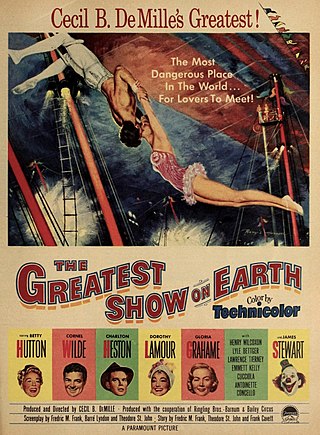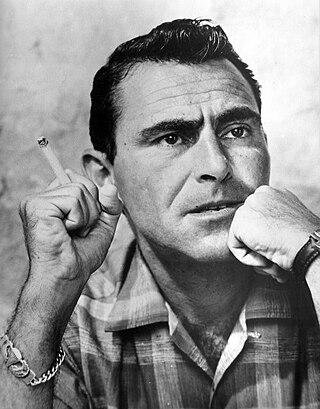Related Research Articles

The Greatest Show on Earth is a 1952 American drama film produced and directed by Cecil B. DeMille, shot in Technicolor and released by Paramount Pictures. Set in the Ringling Bros. and Barnum & Bailey Circus, the film stars Betty Hutton and Cornel Wilde as trapeze artists competing for the center ring and Charlton Heston as the circus manager. James Stewart also stars as a mysterious clown who never removes his makeup, and Dorothy Lamour and Gloria Grahame also play supporting roles.

Rodman Edward Serling was an American screenwriter and television producer best known for his live television dramas of the 1950s and his anthology television series The Twilight Zone. Serling was active in politics, both on and off the screen, and helped form television industry standards. He was known as the "angry young man" of Hollywood, clashing with television executives and sponsors over a wide range of issues, including censorship, racism, and war.

"And When the Sky Was Opened" is the eleventh episode of the American television anthology series The Twilight Zone. It originally aired on December 11, 1959. It is an adaptation of the 1953 Richard Matheson short story "Disappearing Act."
"I Shot an Arrow into the Air" is the fifteenth episode of the American television anthology series The Twilight Zone.
"The Purple Testament" is the nineteenth episode of the American television anthology series The Twilight Zone. It is "the story of a man who can forecast death". It originally aired on February 12, 1960, on CBS.

"Twenty Two" is episode 53 of the American television series The Twilight Zone. The story was adapted by Rod Serling from a short anecdote in the 1944 Bennett Cerf Random House anthology Famous Ghost Stories, which itself was an adaptation of "The Bus-Conductor", a short story by E. F. Benson published in The Pall Mall Magazine in 1906. It was one of the six episodes of the second season which were shot on videotape in a short-lived experiment aimed to cut costs, and was directed by Jack Smight.

Marguerite McNamara was an American stage, film, and television actress and model from the United States. McNamara began her career as a teenage fashion model. She first came to public attention as Patty O'Neill in the 1951 national tour of F. Hugh Herbert's The Moon Is Blue which ran concurrently with the original Broadway production. In 1952 she succeeded Barbara Bel Geddes in that role in the Broadway production. Both productions were directed by Otto Preminger, and Preminger also directed McNamara in that role in the controversial 1953 film adaptation of that work. She earned an Academy Award nomination for Best Actress for her role in the film.

A gremlin is a mischievous folkloric creature invented at the beginning of the 20th century to originally explain malfunctions in aircraft, and later in other machinery, processes, and their operators. Depictions of these creatures vary widely. Stories about them and references to them as the causes of especially inexplicable technical and mental problems of pilots were especially popular during and after World War II.

The Brown Bunny is a 2003 film written, directed, produced, photographed and edited by Vincent Gallo. Starring Gallo and Chloë Sevigny, it tells the story of a motorcycle racer on a cross-country drive who is haunted by memories of his former lover. It was photographed with handheld 16 mm cameras in various locations throughout the United States, including New Hampshire, Massachusetts, Ohio, Missouri, Utah, Nevada, and California.

On the Town is a musical with music by Leonard Bernstein and book and lyrics by Betty Comden and Adolph Green, based on Jerome Robbins' idea for his 1944 ballet Fancy Free, which he had set to Bernstein's music. The musical introduced several popular and classic songs, among them "New York, New York", "Lonely Town", "I Can Cook, Too", and "Some Other Time". The story concerns three American sailors on a 24-hour shore leave in New York City during World War II, 1944. Each of the three sailors meets and quickly connects with a woman.

110 in the Shade is a musical with a book by N. Richard Nash, lyrics by Tom Jones, and music by Harvey Schmidt.
"The Last Rites of Jeff Myrtlebank" is episode 88 of the American television anthology series The Twilight Zone. It originally aired on February 23, 1962 on CBS.

Twilight Zone: The Movie is a 1983 American science fiction anthology film produced by Steven Spielberg and John Landis. Based on Rod Serling's 1959–1964 television series of the same name, the film features four stories directed by Landis, Spielberg, Joe Dante, and George Miller. Landis' segment is an original story created for the film, while the segments by Spielberg, Dante, and Miller are remakes of episodes from the original series. The film's cast includes Dan Aykroyd, Albert Brooks, Scatman Crothers, John Lithgow, Vic Morrow, and Kathleen Quinlan. Original series cast members Burgess Meredith, Patricia Barry, Peter Brocco, Murray Matheson, Kevin McCarthy, Bill Mumy, and William Schallert also appear in the film, with Meredith assuming Serling's role as narrator.
William DeClercq Reynolds was an American actor. He was best known for his role as Special Agent Tom Colby in the 1960s television series The F.B.I. and his film and television roles during the 1950s through the 1970s.
"Stopover in a Quiet Town" is episode 150 of the American television anthology series The Twilight Zone starring Barry Nelson and Nancy Malone. It originally aired on April 24, 1964.
"Come Wander with Me" is the final episode to be filmed of the American television series The Twilight Zone. This episode introduced Bonnie Beecher in her television debut.

Danger, Go Slow is a 1918 American silent comedy film directed by Robert Z. Leonard, and starring Mae Murray, Jack Mulhall and Lon Chaney. Robert Z. Leonard and Mae Murray co-wrote the screenplay together. The film is today considered lost.
Howardsville is an unincorporated community in Albemarle County, Virginia.

Lone Texas Ranger is a 1945 American Western film directed by Spencer Gordon Bennet starring Wild Bill Elliott in the role of Red Ryder and costarring as Little Beaver, actor (Bobby) Robert Blake. It was the eighth of twenty-three Red Ryder feature films that would be produced by Republic Pictures. The picture was shot on the studio’s back lot along with outdoor locations at Iverson Ranch, 1 Iverson Lane, Chatsworth, Los Angeles, CA, USA.

C.A.T. Squad: Python Wolf is a 1988 television film directed by William Friedkin and starring Joseph Cortese, Jack Youngblood, Steve James, and Deborah Van Valkenburgh. It is the sequel to C.A.T. Squad (1986) and aired May 23, 1988.
References
- DeVoe, Bill. (2008). Trivia from The Twilight Zone. Albany, GA: Bear Manor Media. ISBN 978-1-59393-136-0
- Grams, Martin. (2008). The Twilight Zone: Unlocking the Door to a Television Classic. Churchville, MD: OTR Publishing. ISBN 978-0-9703310-9-0
- Zicree, Marc Scott: The Twilight Zone Companion. Sillman-James Press, 1982 (second edition)